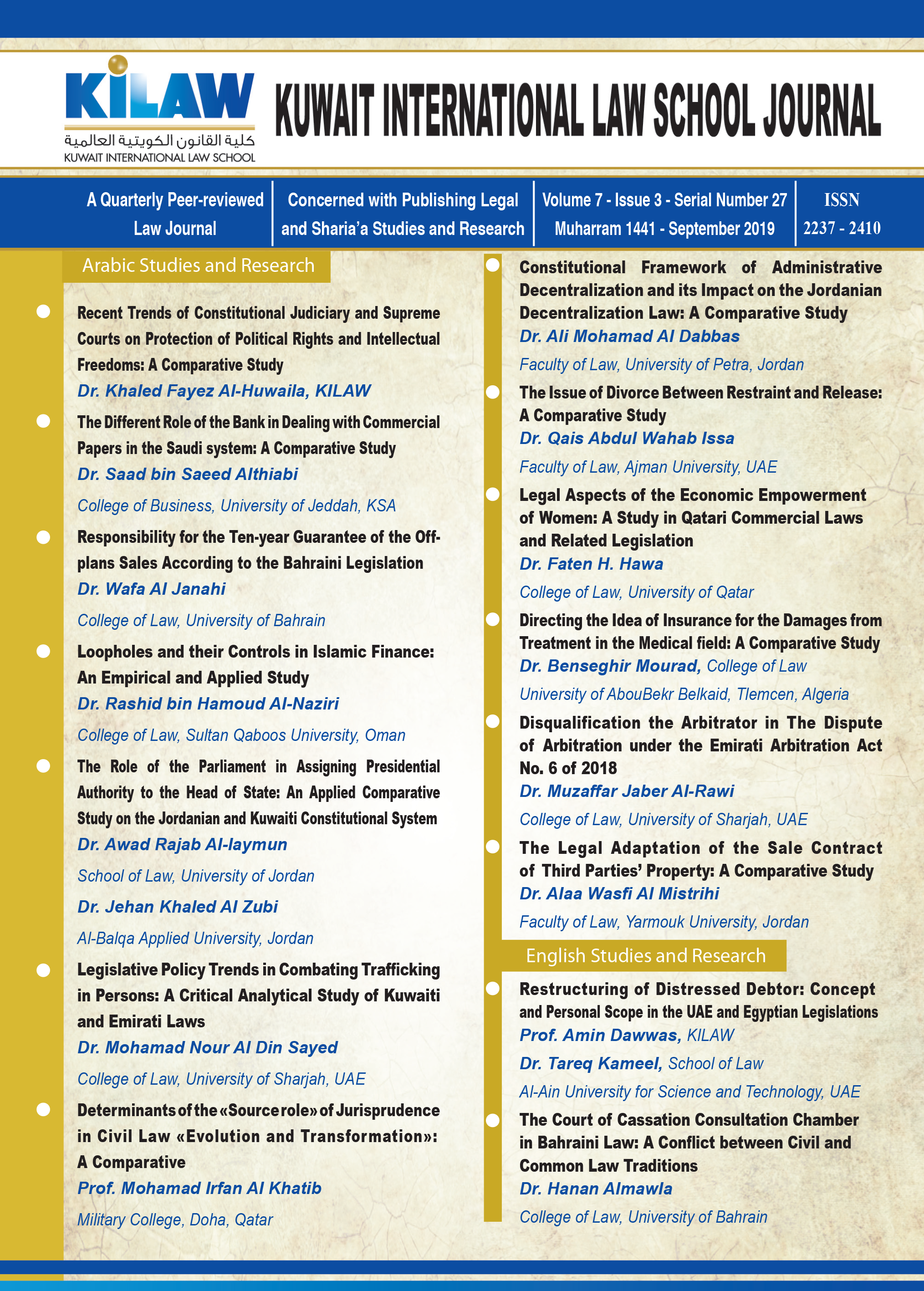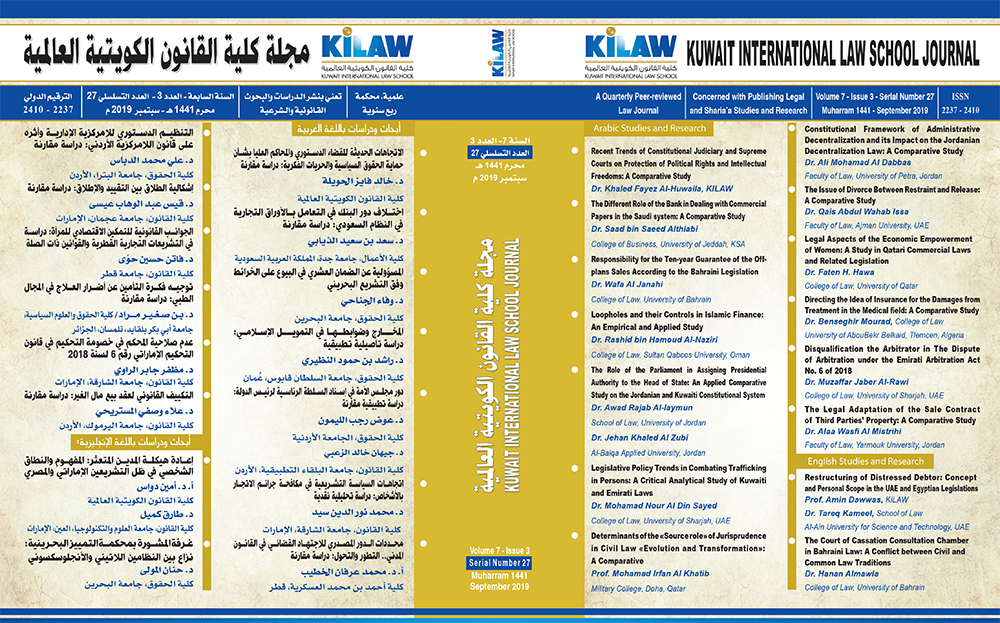| Volume 7 | Muharram 1441 |
| Issue 3 | September 2018 |
| ISSN 24102237 |

Editorial
Respecting the Powers and Competences of Constitutional Authorities in the Parliamentary System and the Recent English Supreme Court Ruling
By: Prof. Badria A. Al-Awadi
Editor-in-Chief
The parliamentary system in its organization of constitutional and political life within the state in the modern era is based on a set of basic principles, features and foundations, which have been established and deepened through experiences, stages and accumulated legacy, and enabled a positive assimilation of social and political forces and the organization of a peaceful transfer of power to serve societies and achieve their comprehensive development rise. The principle of the independence of the constitutional authorities and respect for their competences and powers by each other has been a cornerstone in ensuring the effectiveness of the institutions of this system and preserving the sovereignty of the nation and ensuring due respect for the will of the people, which is reflected in freely and fairly elected parliaments, …
Respecting the Powers and Competences of Constitutional Authorities in the Parliamentary System and the Recent English Supreme Court Ruling
Chief-in-Editor Prof. Badria A. Al-Awadi
The parliamentary system in its organization of constitutional and political life within the state in the modern era is based on a set of basic principles, features and foundations, which have been established and deepened through experiences, stages and accumulated legacy, and enabled a positive assimilation of social and political forces and the organization of a peaceful transfer of power to serve societies and achieve their comprehensive development rise. The principle of the independence of the constitutional authorities and respect for their competences and powers by each other has been a cornerstone in ensuring the effectiveness of the institutions of this system and preserving the sovereignty of the nation and ensuring due respect for the will of the people, which is reflected in freely and fairly elected parliaments, and without affecting them through corrupt money, forgery, bribery, or other ways of influencing the will of the electorate.
Although the above was no longer a theoretical matter in light of the practical applications of the mechanisms of work of the parliamentary system in countries of different continents, civilizations, cultures and societies; the contemporary facts confirm beyond any doubt that respecting the origins, rules and areas of jurisdiction and work of the authorities and constitutional institutions constitutes a true guarantee of the states’ stability, development and revival. It also restrains acts of arbitrariness and violation of the authorities’ powers as well as the popular will and public freedoms. This is achieved through a constitutional and political system in which each authority exercises its powers and competences.
The recent ruling of the UK Supreme Court, issued on September 23, 2019, is one of these cases. This ruling is issued regarding an appeal against the decision of British Prime Minister Boris Johnson, issued on August 28, 2019, stipulating the suspension of Parliament for a month (from September 12 to October 12, 2019) in order to make way for his government to implement the Brexit procedures, describing (i.e. the prime minister) the decision as: “a routine step to make room for his government to launch a new legislative program next month.” This decision led to a state of political tension and congestion in the country, as it was rejected by the then Speaker of the House of Commons John Bercow, who described it as a violation of the constitution, and that “shutting down Parliament would be an offence against the democratic process and the rights of parliamentarian’s as the people’s elected representatives.” Also, the leader of the opposition, Jeremy Corbyn, considered the decision a “smash and grab on our democracy to force through a no deal”. He wrote a letter of protest and rejection to the Queen co-signed by Liberal Democratic Party leader Joe Swenson. The Prime Minister of Scotland, a member of the United Kingdom, has also expressed her rejection, and more than 500,000 Britons have signed a petition rejecting the decision to suspend the Parliament within two hours of its issuance, calling on the Parliament to resume its sessions.
Due to this tension, the Supreme Court decided to expedite the procedures for reviewing the appeal submitted to the Prime Minister’s decision. The Supreme Court ruled unanimously by its eleven members, that this decision is “unlawful because it had the effect of frustrating or preventing the ability of parliament to carry out its constitutional functions without reasonable justification. Therefore it is void and of no effect,” calling the parliament to meet soon. The Court affirmed in the merits of its decision first that it has jurisdiction to consider the case on the grounds that it is related to the existence and limits of the powers granted to the Prime Minister and the legality of the action he took, noting in this regard that the court exercised judicial control over illegal government actions for several centuries. The court added that the first question raised by this issue relates to whether the prime minister’s decision to disrupt the work of parliament (to prorogue the parliament) is lawful or unlawful, and the second question relates to the limits of the prerogative authority or privilege of the prime minister in making that decision.
The court indicated that there are two main principles in the English constitution that must be observed to resolve the dispute before it, related to the legality and legitimacy of the Prime Minister’s decision to prorogue the Parliament. The first is the principle of Parliamentary Sovereignty, which means that the Parliament sets the laws that everyone must respect and submit to, indicating that this matter will be undermined if the executive branch, through the exercise of the concession granted to it, is able to prevent Parliament from exercising its constitutional powers in enacting laws during any given time. The second principle is the Parliamentary Accountability, which Lord Bingham, a senior Law Lord, has expressed by saying: “the conduct of government by a Prime Minister and Cabinet collectively responsible and accountable to parliament lies at the heart of Westminster democracy.”
Accordingly, the court concluded that the Prime Minister’s decision to prorogue the Parliament is unlawful because it prevents the Parliament from exercising its constitutional powers and prevents the implementation of the principle of parliamentary oversight and accountability over the executive authority, which are basic principles and pillars of the English constitutional system.
If this ruling does not constitute a judicial precedent with regard to relations between the authorities or the tendency of the executive to dominate and transcend constitutional powers and limits, it only affirms the effective role of the three constitutional authorities in the parliamentary system, especially the judiciary whose positive and effective role is a guarantee of balance and relations of cooperation between the authorities and respect for the provisions of the constitution, which reflects positively on achieving national, social and development interests. It is natural for the comparative constitutional and judicial systems that the diligence of the English Supreme Court and others regarding the boundaries of the relationship between the constitutional authorities and the nature of their powers is a model for study and analysis. It benefits the development of the constitutional life, especially for countries that have made progress in this field and its constitution clearly move towards a parliamentary system.
Content
Arabic Studies and Research
Recent Trends of Constitutional Judiciary and Supreme Courts on Protection of Political Rights and Intellectual Freedoms: A Comparative Study (Kuwait – Egypt)
Dr. Khaled Fayez Al-Huwaila
Assistant Professor of Public Law
KILAW
The different Role of the Bank in Dealing with Commercial Papers in the Saudi System: A Comparative Study
Dr. Saad bin Saeed Althiabi
Associate Professor - Department of Law
College of Business - University of Jeddah - KSA
Responsibility for the Ten-year Guarantee of the Off-plans Sales According to the Bahraini Legislation: Reading in Law No. (27) of 2017 Regarding the Regulation of the Real Estate Sector and Executive Decisions Issued Regarding its Implementation
Dr. Wafa Al Janahi
Assistant Professor of Civil Law
College of Law - University of Bahrain
Loopholes and their Controls in Islamic Finance: An Empirical and Applied Study
Dr. Rashid bin Hamoud Al-Naziri
Assistant Professor - College of Law
Sultan Qaboos University - Oman
The Role of the Parliament in Assigning Presidential Authority to the Head of State: An Applied Comparative Study on the Jordanian and Kuwaiti Constitutional System
Dr. Awad Rajab Al-laymun
Associate Professor of Constitutional Law
Faculty of Law - University of Jordan
Dr. Jehan Khaled Al Zubi
Assistant Professor - Faculty of Law
Al-Balqa Applied University - Jordan
Legislative Policy Trends in Combating Trafficking in Persons: A Critical Analytical Study of Kuwaiti and Emirati Laws
Dr. Mohamad Nour Al Din Sayed
Associate Professor of Criminal Law
College of Law - University of Sharjah - UAE
Determinants of the “Source role” of Jurisprudence in Civil Law “Evolution and Transformation” A Comparative Study between the French and Arabic Schools An example of Egyptian, Syrian and Lebanese law
Prof. Mohamad Irfan Al Khatib
Professor of Civil Law - Ahmed bin Mohammed
Military College - Doha - Qatar
Constitutional Framework of Administrative Decentralization and its Impact on the Jordanian Decentralization Law: A Comparative Study
Dr. Ali Mohamad Al Dabbas
Assistant Professor of Public Law
Faculty of Law - University of Petra - Jordan
The Issue of Divorce between Restraint and Release: A Comparative Study
Dr. Qais Abdul Wahab Issa
Associate Professor of Personal Status Law
Faculty of Law - Ajman University - UAE
Legal Aspects of the Economic Empowerment of Women: A Study in Qatari Commercial Laws and Related Legislation
Dr. Faten H. Hawa
Associate Professor of Commercial Law
College of Law - University of Qatar
Directing the Idea of Insurance for the Damages from Treatment in the Medical field: A Comparative Study
Dr. Benseghir Mourad
College of Law and Political Sciences
University of AbouBekr Belkaid - Tlemcen - Algeria
Disqualification the Arbitrator in The Dispute of Arbitration under the Emirati Arbitration Act No. 6 of 2018
Dr. Muzaffar Jaber Al-Rawi
Associate Professor of Arbitration and Commercial Law
College of Law - University of Sharjah - UAE
The Legal Adaptation of the Sale Contract of Third Parties’ Property: A Comparative Study Between the Journal of Judicial Judgments, Jordanian Civil Law, and Egyptian and Kuwaiti Civil Laws
Dr. Alaa Wasfi Al Mistrihi
Assistant Professor of Civil Law
Faculty of Law - Yarmouk University - Jordan
English Studies and Research
Restructuring of Distressed Debtor: Concept and Personal Scopein the UAE and Egyptian Legislations
Prof. Amin Dawwas
Professor of Private Law KILAW
Dr. Tareq Kameel
Associate Professor of Commercial Law
Al-Ain University for Science and Technology UAE
The Court of Cassation Consultation Chamber in Bahraini Law: A Conflict between Civil and Common Law Traditions
Dr. Hanan Almawla
Assistant Professor
College of Law University of Bahrain

